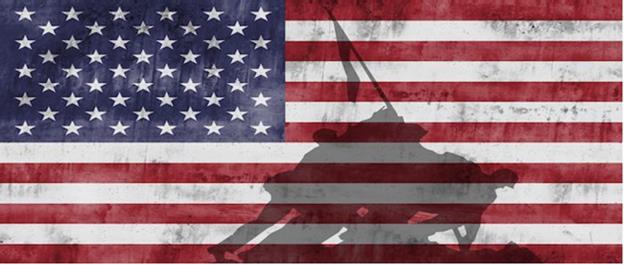Posted with permission of John E. Michel, Brig. Gen., USAF – Commanding General, NATO Air Training Command-Afghanistan; Commander, 438th Air Expeditionary Wing
“Those who have the privilege to know have the duty to act.” Albert Einstein
It has been called the greatest photograph of all time. It may well be the most widely reproduced, even winning the Pulitzer Prize for photography. Snapped on February 23, 1945 as our nation was fighting its way across the Pacific as part of the World War II island hopping campaign, it served as the symbol for the Seventh War Loan Drive, adorned a postage stamp, and appeared on the cover of countless magazines and newspapers across the globe. The photo even served as the model for the Marine Corps War Memorial that today stands in Arlington, Virginia–a timeless symbol of the cost our military members are willing to bear in defending the values, ideas, and principles this great nation was originally founded upon.
The famous picture of five marines and a navy corpsman struggling to raise the flag atop Mount Suribachi on the tiny island of Iwo Jima in the middle of the Pacific Ocean perfectly captures the sense of momentum of six people straining toward a common goal. In this instance, that goal was to mark claim to the most strategic point on the island following one of the costliest battles in Marine Corps history. Its toll of 6,821 Americans dead, 5,931 of them Marines, accounted for nearly one-third of all Marine Corps losses during World War II.
Eyewitness accounts confirm that the raising of the flag on the fourth day of the bloody battle of Iwo Jima ignited a wave of energy and enthusiasm that could be heard across the island. Just as the battle was bogging down and progress was reduced to mere inches an hour, the moment that red, white, and blue of our nation’s flag was seen proudly flying atop that hilltop, American troops were filled with a new found vigor and vitality. The momentum of that moment subsequently inspired them to push through to achieve the mission of conquering what would become the first Japanese homeland soil to be captured by the Americans.
In my view, this inspiring story of these six courageous servicemembers serve as a vivid reminder of why we as Americans are willing to so diligently preserve freedom. That is, we innately understand freedom, the power to act, speak and think without restraints, is a gift–a treasure worth fighting for.
Viewed in this sense, freedom is a priceless commodity as it provides individuals, families, teams, communities, and even entire countries the opportunity to grow into their potential. As the great enabler of individual and collective development, it is no surprise why it remains something we each should relentlessly pursue, jealously guard and above all, selflessly defend.
Lord Acton, a prominent figure in the nineteenth century, described freedom as the certainty we can at any time do what we should do. Today, however, we tend to pursue a less altruistic definition of freedom in our country, viewing it more as doing what we want to do. Ironically, this misguided view of freedom enslaves more than it liberates. It holds us captive by our desire for instant gratification. And it undermines the very premise of democracy by which our great country was founded.
Think about it. It is the willingness of individuals and societies to choose to do what they should over what they want that gave America the freedom we enjoy today. I doubt the early freedom fighters and frontiersmen who wrestled America away from those who wanted this country for themselves preferred taking up arms to spending time with their families, working in their businesses, or contributing to their communities. Yet the absence of freedom from fear, want and unjust control compelled them to act. And as history confirms, act they did.
The 1% of us who today carry on in the proud tradition of donning the cloth of the nation consider it an immense privilege to join a long line of others before us in protecting the precious gift of freedom. In fact, the very oath each and every Soldier, Sailor, Airman, Marine and Coast Guardsmen takes upon entry into the military serves to remind us we are committing to lead our lives for a higher purpose. And that purpose is to support and defend a way of life that transcends ourselves.
Science confirms we are wired from birth to contribute to a cause larger than ourselves. Sociologist Ernest Becker writes, “Man will lay down his life for his country, his society, his family. He will choose to throw himself on a grenade to save his comrades; he is capable of the highest generosity and self-sacrifice. But he has to feel and believe that what he is doing is truly heroic, timeless, and supremely meaningful.”
What Becker is reminding us of is the fact that achieving true happiness and satisfaction in life requires us to pursue goals that are relevant, honorable, and that contribute to creating the kind of society we each desire and deserve. Life cannot be merely about us. If we want to continue to thrive as citizens and as a nation, we must resolve to each do our part, in small ways and big ways, to fight for freedom–to do our part as leaders in our homes, workplaces, worship spaces, and communities to create conditions for the realization of human fulfillment.
More information on Gen. Michel and his articles can be found at GeneralLeadership.com

COMMENTS
Please let us know if you're having issues with commenting.